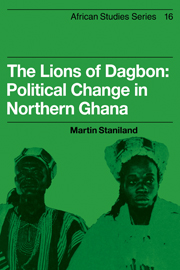Book contents
- Frontmatter
- Contents
- List of maps, figures, and tables
- Preface
- Abbreviations and glossary
- Map 1 Northern Ghana, 1965
- 1 The country and the people
- 2 Dagbon
- 3 Colonial rule, 1899–1930
- 4 Dagomba divided and united, 1899–1930
- 5 The battle of Watherston Road
- 6 Dagomba politics under indirect rule, 1932–1947
- 7 Votibu
- 8 Party politics
- 9 The Yendi tragedy
- 10 Conclusions
- Appendixes
- Notes
- Bibliography
- Index
9 - The Yendi tragedy
Published online by Cambridge University Press: 04 August 2010
- Frontmatter
- Contents
- List of maps, figures, and tables
- Preface
- Abbreviations and glossary
- Map 1 Northern Ghana, 1965
- 1 The country and the people
- 2 Dagbon
- 3 Colonial rule, 1899–1930
- 4 Dagomba divided and united, 1899–1930
- 5 The battle of Watherston Road
- 6 Dagomba politics under indirect rule, 1932–1947
- 7 Votibu
- 8 Party politics
- 9 The Yendi tragedy
- 10 Conclusions
- Appendixes
- Notes
- Bibliography
- Index
Summary
The 1960 legislation, whatever its faults, gave the Dagomba kingdom six years of peace, though during this period the regime which was responsible grew corrupt and finally collapsed, on the morning of 24 February 1966. While it lasted, the C.P.P. regime expanded its patronage continually. In 1962 a whole new set of Local Councils came into existence and were filled by party nominees; by 1965, Dagomba had nine M.P.s; schools, roads, and welfare facilities developed in the north as never before, bringing with them new opportunities for the young, as well as jobs and contracts for their elders.
As long as the C.P.P. remained in power, the two branches of the royal dynasty accepted Legislative Instrument No. 59. The only disturbance of the truce was caused by an attempt on the part of the Abudus to win favour among the grandsons (a category which included both the Yo-Na and the Karaga-Na) and, in effect, to undermine the settlement. In 1961 some members of the State Council produced a document which, ignoring the provisions of L.I.59, defiantly re-stated the rules of succession adopted in 1953. The Ya-Na claimed that this document had been approved unanimously by the State Council, but the Mion-lana said that it had not even been discussed: the signatures on the document had (he alleged) been obtained by misrepresentation of its contents.
- Type
- Chapter
- Information
- The Lions of DagbonPolitical Change in Northern Ghana, pp. 148 - 168Publisher: Cambridge University PressPrint publication year: 1975



